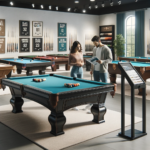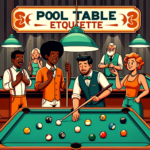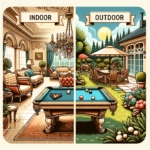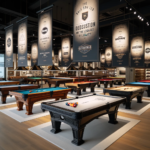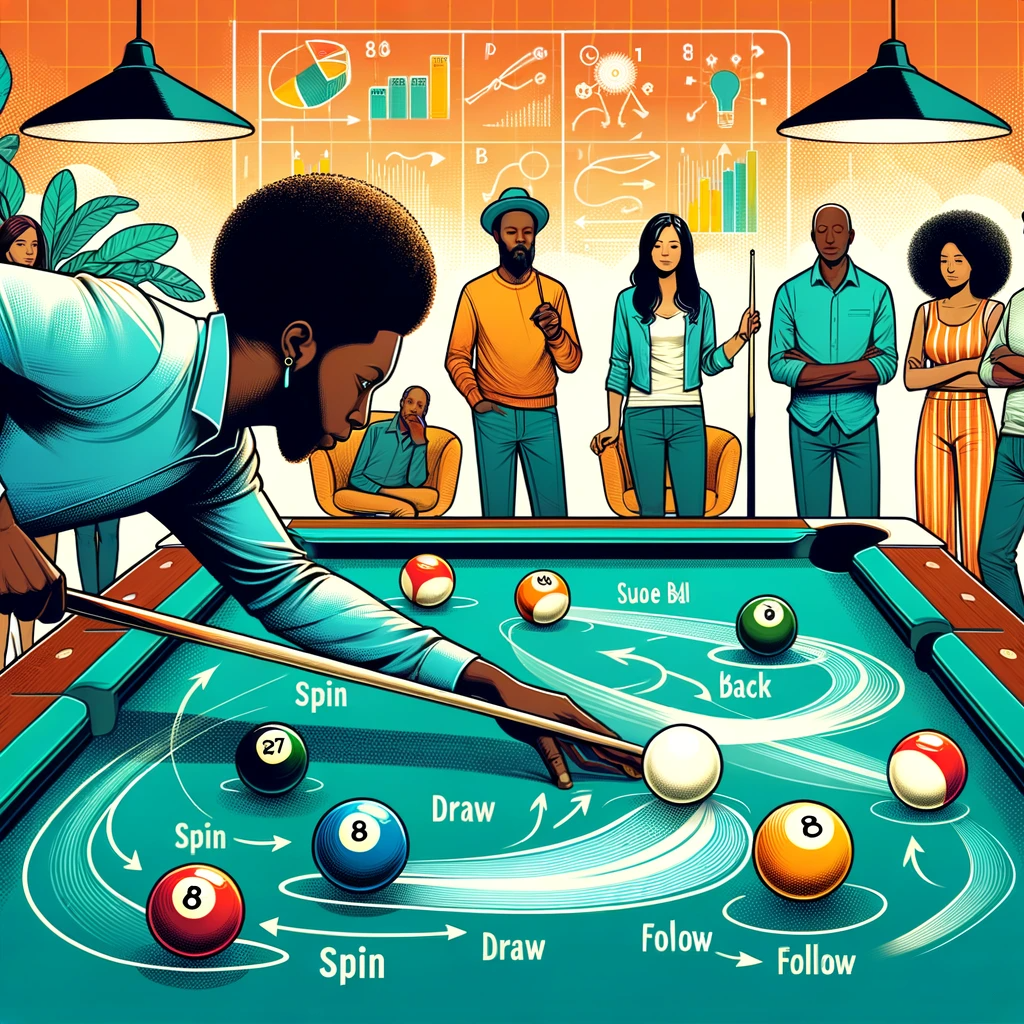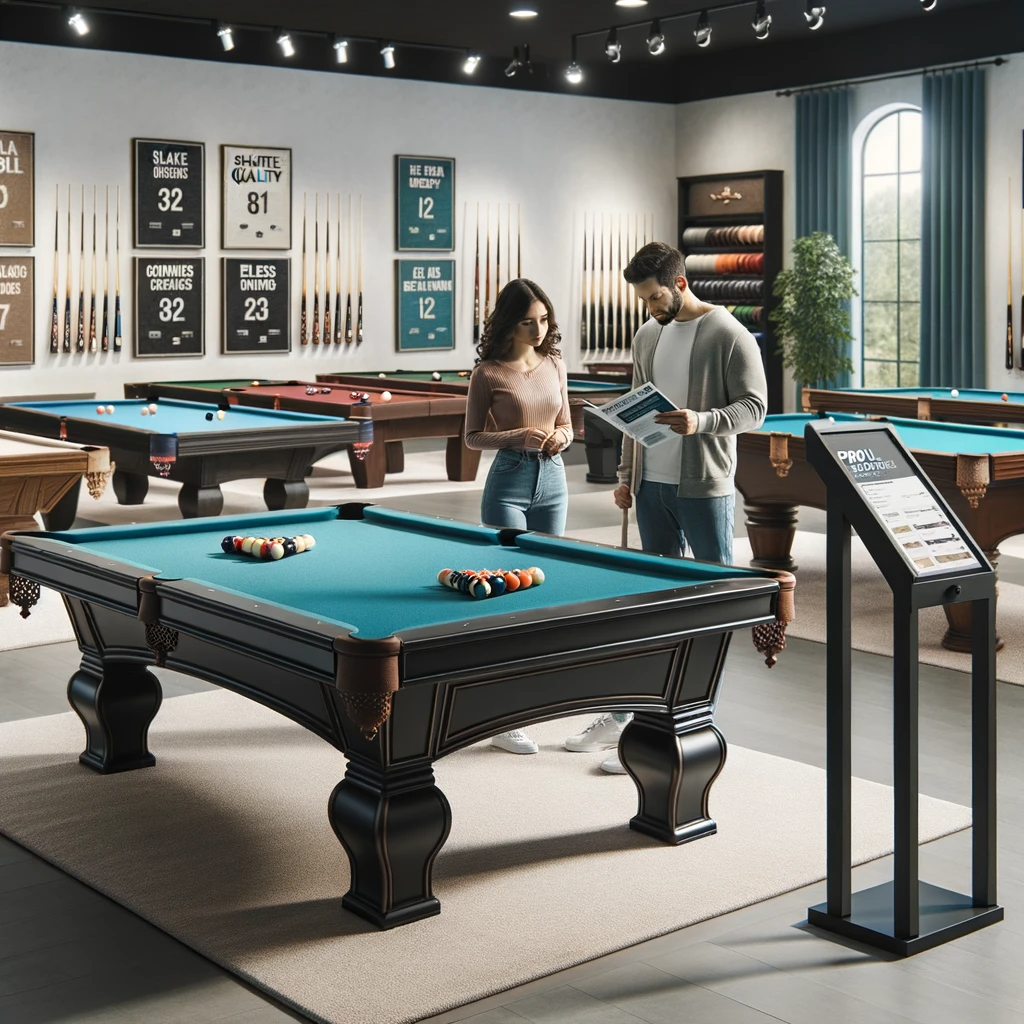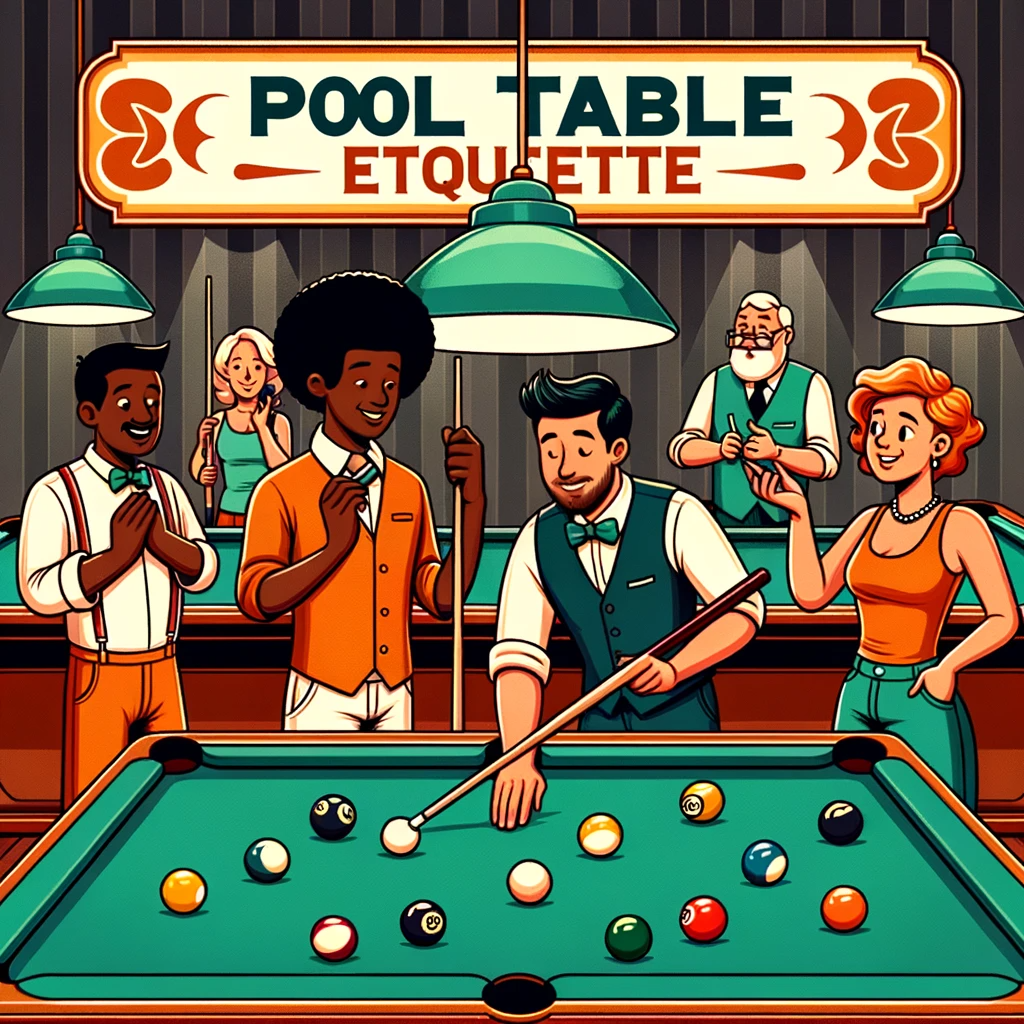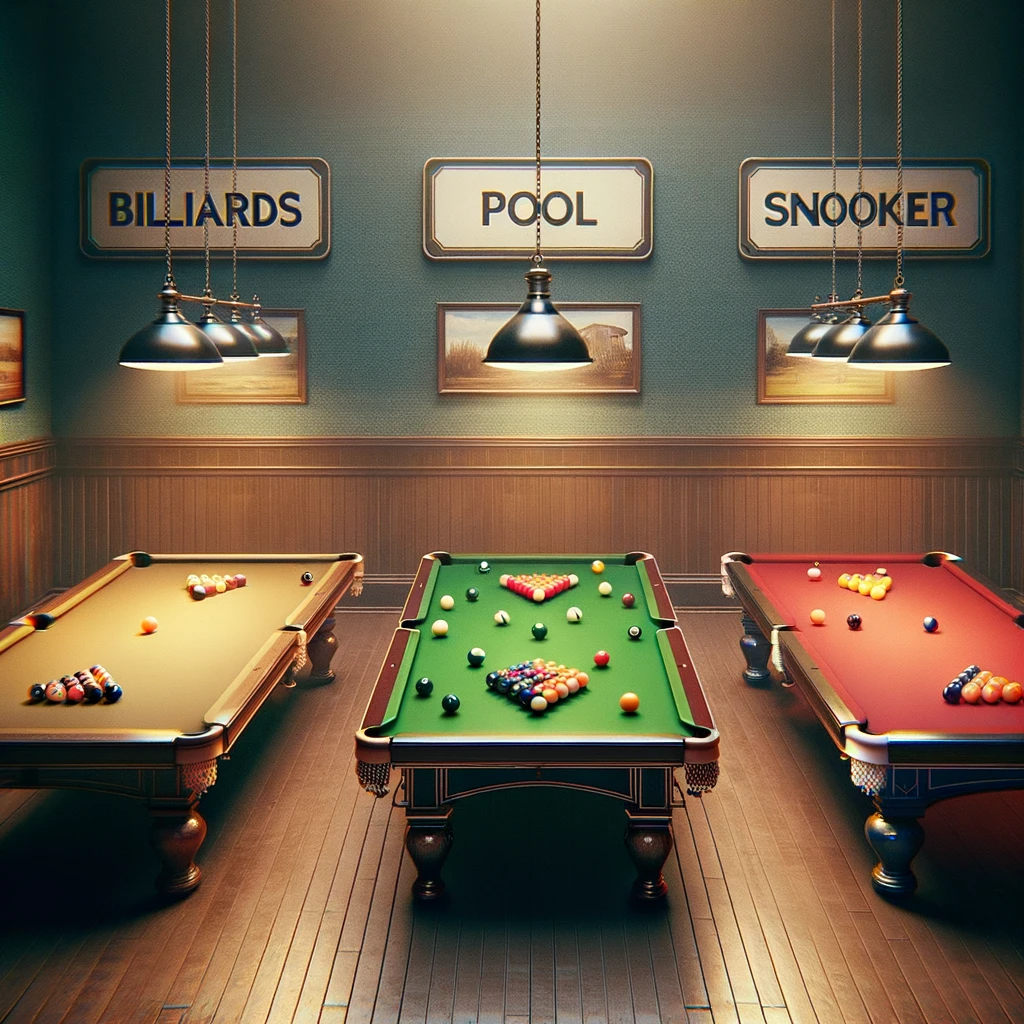Introduction
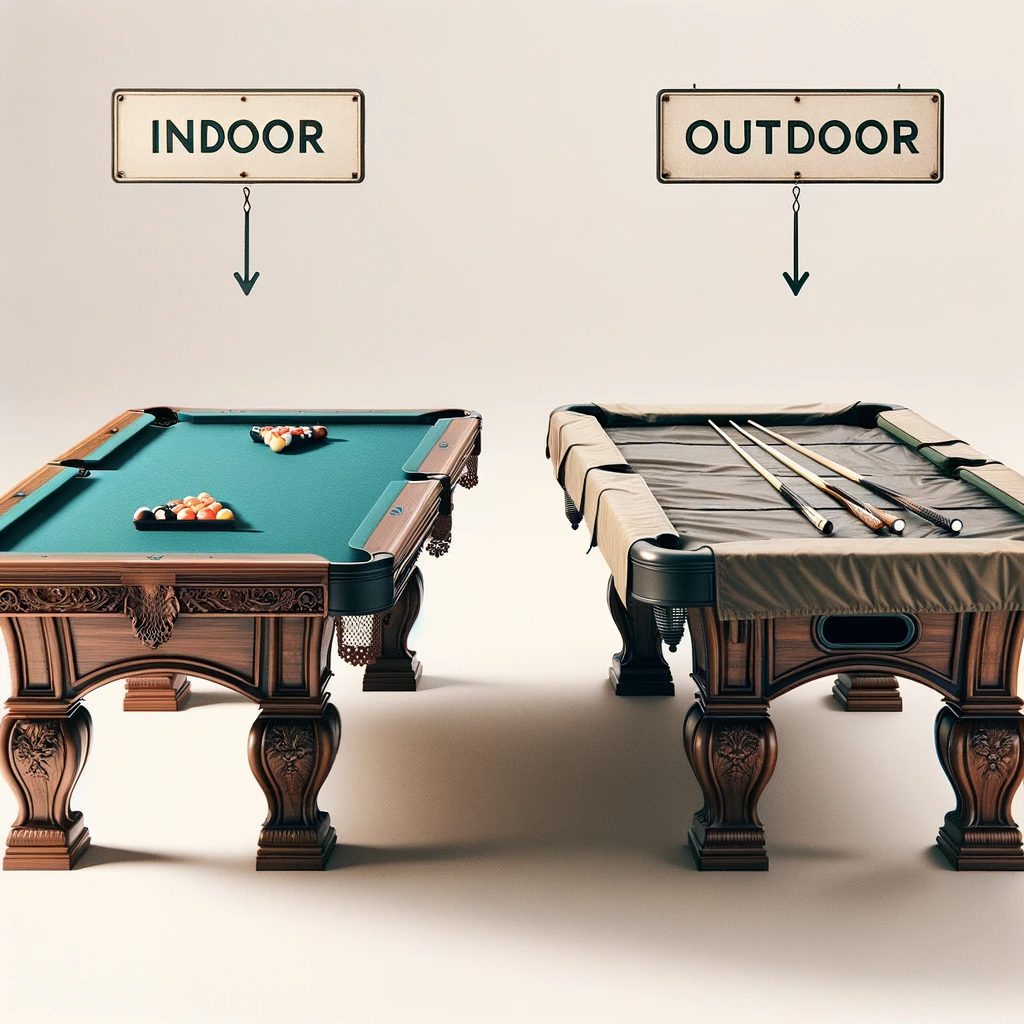
Pool tables have long been a beloved source of entertainment and friendly competition. They provide hours of fun for both casual players and serious enthusiasts.
With their smooth green surfaces, meticulously placed pockets, and assortment of colorful balls, pool tables offer a unique blend of precision, strategy, and skill. Now let’s delve into the intriguing world of indoor versus outdoor pool tables.
This comparison will explore the different features, advantages, and disadvantages inherent in each type. Whether you are seeking a table for your home or a public space, understanding the distinctions between indoor and outdoor options will help you make an informed decision that suits your needs and preferences.
Brief Overview: Pool Tables as Popular Recreational Activity
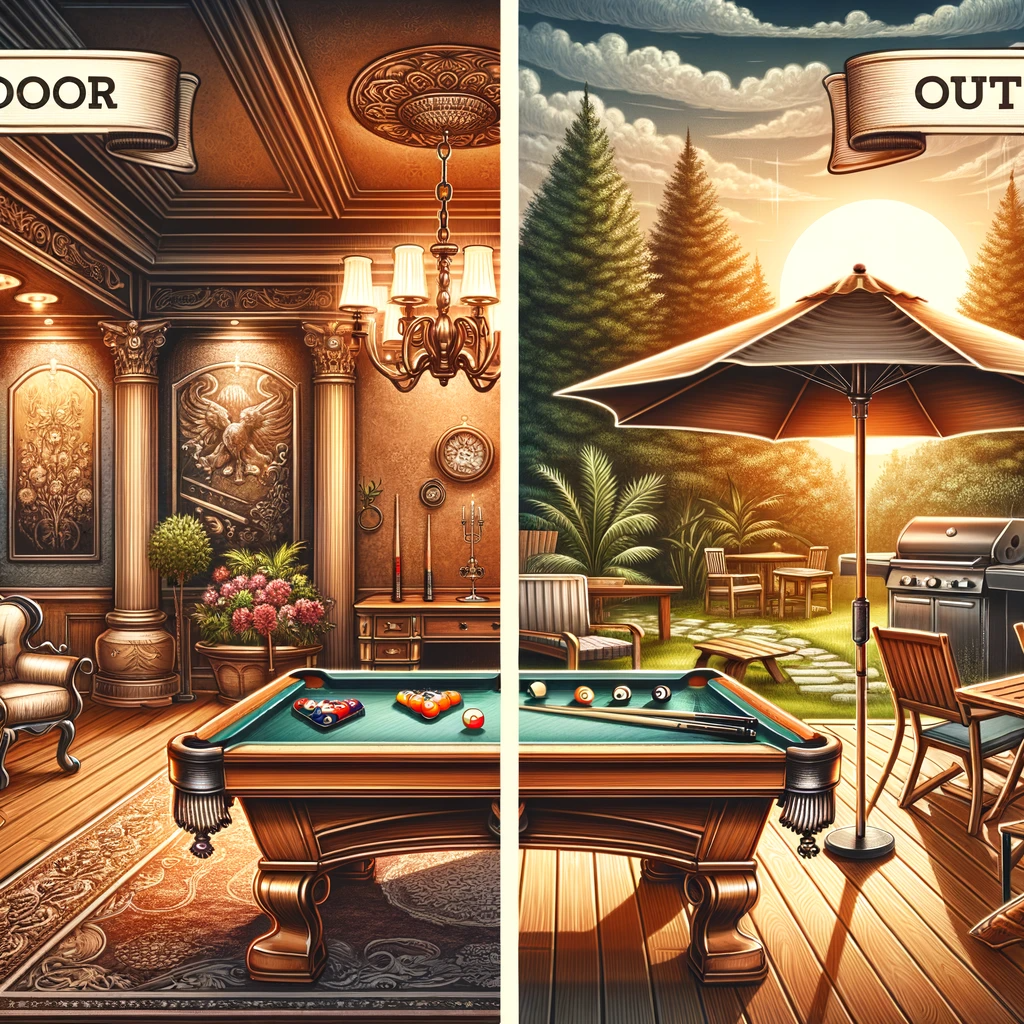
Pool tables have a rich history dating back centuries. Originating from games played on lawns with mace-like cues in Europe during medieval times, pool evolved into its modern form in the 19th century.
Since then, it has achieved worldwide popularity as a recreational activity loved by people of all ages. The objective of pool is to use a cue stick to strike numbered balls into designated pockets on the table.
The game requires precise aim, strategic planning, and expertise in controlling the cue ball’s movement. It can be played competitively or casually among friends and family.
With its origins rooted in aristocratic circles, pool has transcended class boundaries over time to become an accessible pastime enjoyed by individuals from various backgrounds. The allure lies not only in honing one’s skills but also in fostering sociability and camaraderie among players.
Indoor vs Outdoor Pool Tables: An Intriguing Comparison
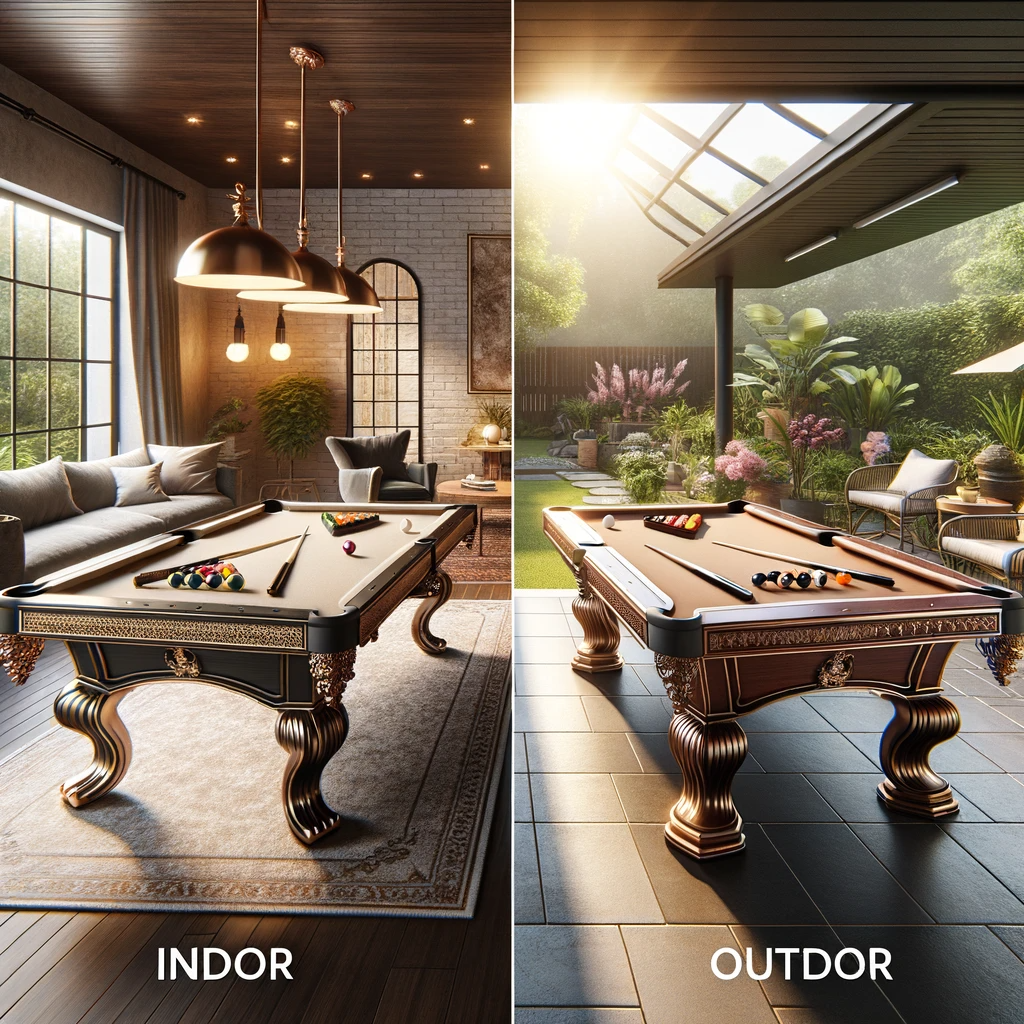
The distinction between indoor and outdoor pool tables arises from differences in design elements catering to specific environments. Indoor pool tables are primarily intended for use within enclosed spaces such as homes or game rooms while outdoor versions are designed to withstand various weather conditions. This comparison will explore the unique features, advantages, and disadvantages of indoor and outdoor pool tables.
By examining their construction materials, playing experiences, and maintenance requirements, we can gain a comprehensive understanding of which option may be more suitable for different scenarios. So let’s dive deeper into the world of indoor versus outdoor pool tables to discover their pros and cons.
Description of Indoor Pool Tables
Indoor pool tables are recreational equipment designed for playing the game of pool indoors. They feature a sturdy and solid construction, typically made from materials such as wood, slate, or synthetic alternatives.
The standard dimensions of indoor pool tables are usually 8 feet, 9 feet, or even larger for professional tournaments. These tables come in various styles and designs to cater to different preferences and interior aesthetics.
Standard Dimensions and Materials Used
Indoor pool tables adhere to specific dimensions to ensure consistency in gameplay. The most common size is the 8-foot table, which measures approximately 4.5 feet in width and 9 feet in length. The playing surface is typically made of slate, a smooth and durable material that provides an optimal playing experience by maintaining a level surface.
In terms of materials used for the frame and legs, hardwood such as oak or maple is commonly utilized due to its strength and durability. Some modern indoor pool tables may also incorporate synthetic materials like MDF (Medium-Density Fiberboard) or engineered woods for cost-efficiency without compromising on quality.
Different Styles and Designs Available
Indoor pool tables offer a wide range of styles and designs to suit various tastes and interior décors. Traditional designs often showcase ornate details with intricate carvings on the legs or frame. Contemporary options feature sleek lines, minimalist aesthetics, and bold color combinations.
Tables may also vary in terms of pocket style – either drop pockets or ball return systems can be found on indoor pool tables. Additionally, some models may come with extra features like built-in scoreboards or cue holders for added convenience during gameplay.
Advantages of Indoor Pool Tables
Playing pool indoors offers several advantages that enhance the overall experience for enthusiasts of this popular game. Firstly, indoor pool tables provide protection from weather elements such as rain, snow, or extreme heat, allowing players to enjoy the game year-round without interruptions. Moreover, the controlled environment indoors contributes to an enhanced playing experience.
Temperature can be regulated, ensuring optimal conditions for both players and the table’s surface. Adequate lighting can be maintained to ensure clear visibility of the balls and a comfortable atmosphere for playing.
Disadvantages of Indoor Pool Tables
While indoor pool tables offer numerous advantages, they also have a few drawbacks to consider. One significant limitation is their space requirements. Depending on the size of the table and surrounding area needed for comfortable play, some households or venues may find it challenging to accommodate an indoor pool table due to limited space availability.
Additionally, moving and installing an indoor pool table can be a complex process that requires careful planning and consideration. The weight of these tables combined with their size often necessitates professional assistance for proper transportation and assembly.
Description of Outdoor Pool Tables and their Features
Outdoor pool tables are specifically designed to withstand the challenges posed by outdoor environments. These pool tables are constructed with durable materials such as stainless steel and waterproof cloth, ensuring their longevity even when exposed to various weather conditions.
The stainless steel components provide resistance against rust and corrosion, making them ideal for outdoor settings where moisture is prevalent. Additionally, the waterproof cloth used on the playing surface ensures that the table can withstand rain or accidental spills without damage.
In terms of design elements, outdoor pool tables often incorporate features that help them endure harsh conditions. One such element is a UV-resistant coating applied to the table’s surface.
This coating protects the table from sun damage and prevents fading or discoloration caused by prolonged exposure to sunlight. The frame of outdoor pool tables is also typically sturdier compared to indoor ones, providing added stability during windy conditions or accidental bumps.
Advantages and Disadvantages of Outdoor Pool Tables
Advantages: Outdoor pool tables offer unique advantages that make them appealing to many enthusiasts. Firstly, they provide an opportunity to enjoy the game in natural surroundings while breathing in fresh air. Playing pool outdoors can create a more relaxing and enjoyable atmosphere for players and spectators alike.
Another advantage is the larger space availability for installation in gardens, patios, or public spaces. Unlike indoor tables that require dedicated rooms or limited spaces within homes or establishments, outdoor pool tables can be set up in open areas with ample room for players to move around comfortably.
Disadvantages: Despite their advantages, there are certain limitations associated with outdoor pool tables. During extreme weather conditions such as heavy rain or snowstorms, these tables may have limited usage due to concerns about water damage to both the table itself and its accessories like cues and balls.
Moreover, exposure to sunlight over an extended period can lead to wear and tear. The constant exposure to UV rays can cause the cloth to fade, affecting the playing surface’s quality.
Additionally, harsh weather conditions like hail or strong winds may pose risks of damage to the table’s components. Overall, outdoor pool tables offer a unique experience but require careful consideration of environmental factors and maintenance to ensure their longevity and optimal performance.
Durability – Differences in Construction Materials
Indoor pool tables are typically constructed using materials like wood and slate for the playing surface, while outdoor pool tables require more durable materials to withstand exposure to weather conditions. Outdoor models often use stainless steel or aluminum frames, as these materials are resistant to rust and corrosion.
The playing surface of outdoor tables is usually made of a waterproof cloth that can withstand rain or moisture. On the other hand, indoor pool tables focus more on aesthetics and may feature intricate designs or luxurious finishes.
Playing Experience – Indoor vs Outdoor Setups
The playing experience on an indoor pool table tends to be consistent and predictable due to the controlled environment. Indoor tables are usually placed in well-lit areas with regulated temperature, ensuring optimal conditions for gameplay.
Outdoor setups offer a unique experience as players can enjoy the game amidst natural surroundings and fresh air. However, factors such as wind, sunlight glare, or uneven ground may slightly affect gameplay.
Maintenance – Taking Care of Your Pool Table
Maintaining an indoor pool table typically involves regular cleaning of the playing surface, lubricating moving parts, and checking for any loose components. Dusting and vacuuming become essential chores to prevent cloth damage or ball roll irregularities. Outdoor pool tables require additional care due to exposure to weather elements.
Cleaning becomes crucial as leaves, dirt, or debris might accumulate on both the playing surface and frame. Regular inspection for any signs of wear caused by sunlight exposure or extreme temperatures is necessary.
Conclusion
When considering whether to choose an indoor or outdoor pool table, one must evaluate their personal preferences along with practical considerations such as available space and intended usage scenarios. While indoor setups offer consistent gameplay in controlled environments with beautiful designs available, outdoor setups provide a unique experience immersed in nature’s ambiance but require additional maintenance efforts due to weather exposure.
Ultimately, no matter which type of pool table you choose, the joy and fun that comes with playing the game will remain constant. So go ahead, select the one that suits your needs, and let the good times roll!

